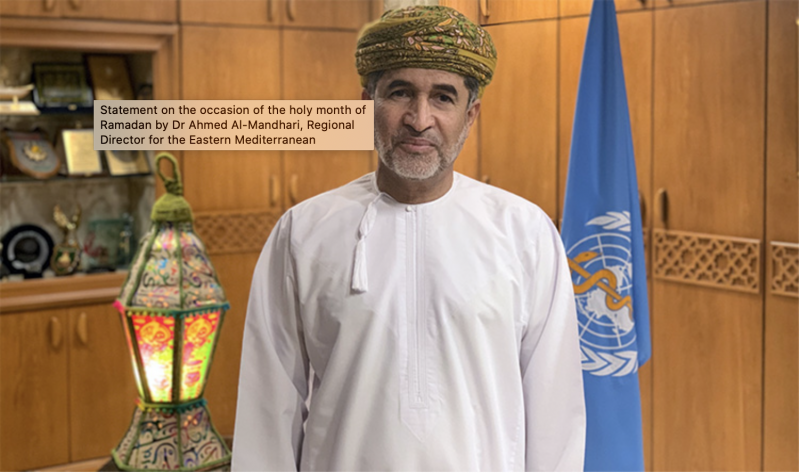
Statement on the occasion of the holy month of Ramadan by Dr Ahmed Al-Mandhari, Regional Director for the Eastern Mediterranean
April 19, 2021
Dear family, friends, and colleagues in the Eastern Mediterranean Region and around the world,
This year, around a billion and a half Muslims worldwide will soon welcome the start of the holy month of Ramadan. One year ago, during the early stages of the pandemic, we found ourselves experiencing Ramadan in a new world. As a result, we found ways of replacing our usual social traditions with new customs, in efforts to protect ourselves and our loved ones.
Unfortunately, this year the situation continues to deteriorate, with more people still being infected and dying of COVID-19, and several countries reporting an increase in cases and deaths. To all the families across the Region who are mourning the loss of loved ones to COVID-19, I offer my heartfelt and sincerest condolences and sympathies.
The COVID-19 pandemic is still a real and present threat. This Ramadan, it is more important than ever to remain vigilant and make compromises for the sake of our health, as well as the health of our communities and loved ones.
As we saw at the end of last year, social events marking the holiday season led to a sharp increase in the number of infected people over the following weeks. This Ramadan, we must not let our short-term desire to spend time with others put more people at risk. Let us all pledge to keep a safe distance, so that we can celebrate the many happy occasions to come, and Ramadan together next year. This responsibility falls on governments and individuals equally.
This week, WHO has released updated guidance on safe Ramadan practices in the context of COVID-19. This includes recommendations on physical distancing measures that need to be taken during prayers, pilgrimages, communal meals, and other social or religious events.
At the same time, it advises that healthy people should be able to fast this year as they have done in previous years, as there is no evidence that fasting increases risk of infection. Individuals suffering from lingering COVID-19 symptoms post-infection may consider religious licenses to break their fasting in consultation with their doctors, as they would do with any other disease.
WHO also encourages a preference for outdoor venues, if gatherings should proceed. Ensuring adequate air flow and ventilation is very important as an indoor, crowded, and inadequately ventilated space are where infected persons can easily spread the virus by spending long periods of time with others.
Wearing masks is important when unable to maintain physical distancing of at least one metre, or in indoor settings where ventilation is poor. Individuals at higher risk of developing severe illness from COVID-19 should wear a medical mask, while others can use a three layer non-medical/fabric mask.
When breaking your fast, eat a variety of fresh, unprocessed foods and drink plenty of water to stay hydrated. Avoid tobacco use, which is not recommended even under normal circumstances. Frequent smokers may already have lung disease, or reduced lung capacity, which greatly increases the risk of serious COVID-19 illness.
While the social traditions related to Ramadan may change, we can all still keep the spirit of Ramadan alive. Instead of physically coming together for family gatherings, we can demonstrate our love for extended family members and friends by encouraging them to stay safely at home while connecting with them by phone or videocalls.